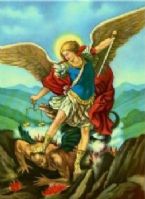
Archangel777
Date: 5/3/2011 10:08:51 AM ( 13 y ago)
 Archangel777 |
|
Feasts of St. Philip and St. James Apostles
James, Son of Alphaeus:Cousin of Jesus. Brother of Saint Jude Thaddeus. Raised is a Jewish home of the time with all the training in Scripture and Law that was part of that life. Convert. One of the Twelve Apostles. One of the first to have visions of the risen Christ. First Bishop of Jerusalem. Met with Saint Paul the Apostle to work out Paul‘s plans for evangelization. Supported the position that Gentile converts did not have to obey all Jewish religious law, though he continued to observe it himself as part of his heritage, may have been a vegetarian. A just and apostolic man known for his prayer life and devotion to the poor. Martyr. Jesus chose him to be one of the 12 pillars of the New Israel, his Church. He is not the James of Acts, son of Clopas, and later bishop of Jerusalem and the traditional author of the Letter of James. James, son of Alphaeus, is also known as James the Lesser to avoid confusing him with James the son of Zebedee, also an apostle and known as James the Greater. Having been beaten to death, a club almost immediately became his symbol. This led to his patronage of fullers and pharmacists, both of whom use clubs in their professions. He is reported to have spent so much time in prayer that his knees thickened, and looked like a camel’s. Soon after the Crucifixion, James said he would fast until Christ returned; the resurrected Jesus appeared to him, and fixed a meal for James Himself.
Philip: Philip came from the same town as Peter and Andrew, Bethsaida in Galilee. Jesus called him directly, whereupon he sought out Nathanael and told him of the “one about whom Moses wrote” (John 1:45). Like the other apostles, Philip took a long time coming to realize who Jesus was. On one occasion, when Jesus saw the great multitude following him and wanted to give them food, he asked Philip where they should buy bread for the people to eat. St. John comments, “[Jesus] said this to test him, because he himself knew what he was going to do” (John 6:6). Philip answered, “Two hundred days’ wages worth of food would not be enough for each of them to have a little [bit]” (John 6:7). John’s story is not a put-down of Philip. It was simply necessary for these men who were to be the foundation stones of the Church to see the clear distinction between humanity’s total helplessness apart from God and the human ability to be a bearer of divine power by God’s gift. On another occasion, we can almost hear the exasperation in Jesus’ voice. After Thomas had complained that they did not know where Jesus was going, Jesus said, “I am the way...If you know me, then you will also know my Father. From now on you do know him and have seen him” (John 14:6a, 7). Then Philip said, “Master, show us the Father, and that will be enough for us” (John 14:8). Enough! Jesus answered, “Have I been with you for so long a time and you still do not know me, Philip? Whoever has seen me has seen the Father” (John 14:9a). Possibly because Philip bore a Greek name or because he was thought to be close to Jesus, some Gentile proselytes came to him and asked him to introduce them to Jesus. Philip went to Andrew, and Andrew went to Jesus. Jesus’ reply in John’s Gospel is indirect; Jesus says that now his “hour” has come, that in a short time he will give his life for Jew and Gentile alike. Like the brothers, Peter and Andrew, Philip was a native of Bethsaida on Lake Genesareth (John 1: 44). He also was among those surrounding John the Baptist when he first pointed out Jesus as the Lamb of God. On the day after Peter's call, Jesus met Philip and called him with the words, "Follow me". Philip obeyed the call, and a little later brought Nathaniel as a new disciple (John 1: 43-45). · Before the miraculous feeding of the multitude, Christ turns towards Philip with the question: "When shall we buy bread, that these may eat?" to which the Apostle answers: "Two hundred penny-worth of bread is not sufficient for them, that every one may take a little" (6: 5-7)
Watch ewtn mass on ewtn channel or go to Mass. Do five Our fathers in their honour!
|
Popularity: message viewed 899 times
URL: http://www.curezone.org/blogs/fm.asp?i=1807167
<< Return to the standard message view
Page generated on: 11/27/2024 12:33:08 PM in Dallas, Texas
www.curezone.org